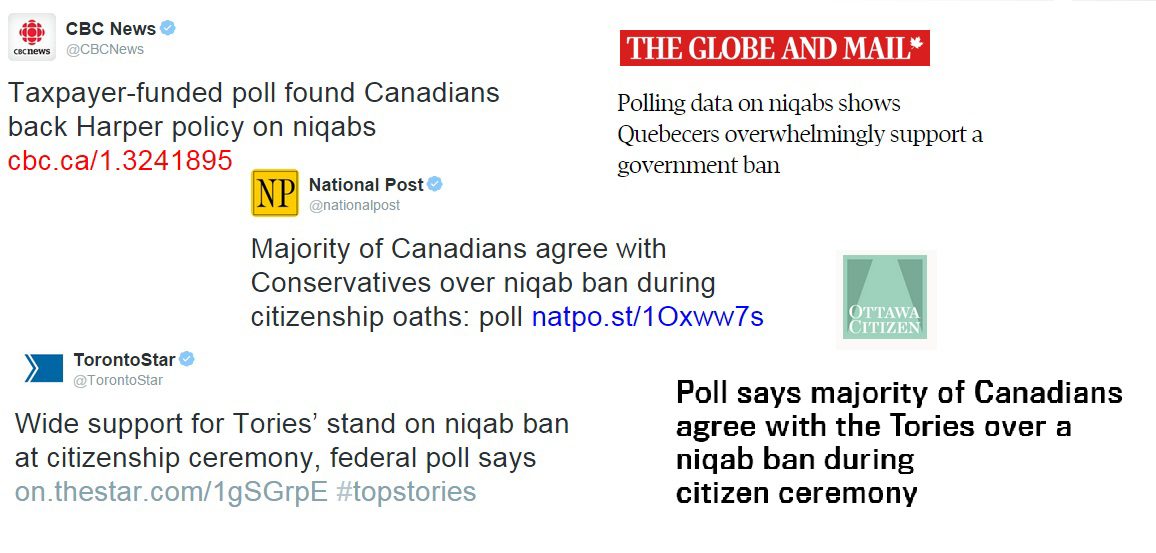In March 2015 the Privy Council Office, which reports to the prime minister, commissioned a survey conducted by Leger Marketing that included a question asking respondents whether they agree with a ban on niqabs in citizenship ceremonies.
The result of that survey, which was released on September 24 and found that 82 percent of respondents favoured the ban, was published in a Canadian Press article written by Stephanie Levitz. The result has since been published by virtually every major Canadian media outlet.
Yet the way the poll has been portrayed by journalists across Canada is misleading, according to the executive director of the Environics Institute, Keith Neuman.
The first issue with the result, according to Neuman, is the wording of the niqab question. The question on the survey was:
“As you know, the Government of Canada has issued a direction requiring people to show their faces when they are being sworn in as Canadian citizens. This direction means that face coverings, such as niqabs or burqas are not permitted during Canadian citizenship ceremonies. Do you support or oppose a requirement that people show their faces during Canadian citizenship ceremonies?”
Neuman says that question is problematic because “it implies that the requirement to remove face coverings is the law, with no mention of recent court rulings to the contrary.”
On February 6, prior to the poll being conducted, the Federal Court of Canada found that the law ordering new citizens to remove the niqab in the citizenship ceremony is “unlawful.” The Federal Court also noted that the ban must be immediately lifted unless the government appeals the ruling and is allowed to suspend the order. The government made this appeal as the poll was being conducted, and the appeal was rejected on October 5.
Neuman also notes there is no mention of the fact that new citizens are required to confirm their identity prior to the actual ceremony, which he says offers a wrong impression of existing laws.
A follow-up question on the survey asked those who agreed with the ban to cite reasons why. Of those who responded, 29 percent cited identification purposes as the reason for their agreement with the ban, while 11 percent said they agreed with the ban because it is the law. As such, according to Neuman, a more accurately worded question may have led to different results.
Another potential issue with the poll, according to Neuman, is that the niqab question was preceded by questions on support for Canadian foreign policy, as well as opposition to ISIL.
“Such questions would have set a context that might well have influenced opinions about government policy pertaining to Muslim practices here in Canada,” Neuman said, adding, “Perhaps if the survey had prefaced this question by first asking about civil liberties or the country’s ethnic diversity, the results may well have been different.”
Neuman says he doesn’t believe the poll was intentionally misleading, and also notes that the methodology is sound. He also calls Leger Marketing “one of the country’s leading research companies.”
Despite this, Neuman says “an issue like this can’t be fully addressed with a single survey question, and there is a problem when the media (and those who consume this media) relies on this one survey question in coming to judgement about what Canadians think about women remaining veiled at citizenship ceremonies, especially in the middle of a divisive election campaign.”
Neuman adds that “we do a grave disservice to the Muslim community and to all Canadians if we rush to judgment that our country is less tolerant of religious diversity than in fact may be the case.”
It’s unlikely that Canadian publications misled the public intentionally, but Neuman is right to note that the result of the widespread use of the poll without any notable analysis (with this Maclean’s piece as a notable exception) may have misled the public.
Editors at Canadian Press, the Toronto Star, the National Post, CBC, The Globe and Mail and CTV News were contacted for comment on Neuman’s claims at 5 p.m. on Thursday. At the time of publication none of these editors have responded with a comment. Their responses will be added to this post if they decide to respond.
About the author
Davide is the blog editor of the spring 2016 issue of the Ryerson Review of Journalism. He also works as an associate editor for the Islamic Monthly. Davide's articles have appeared in numerous publications including Al Jazeera America, The Globe and Mail and the National Post.

